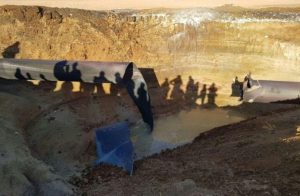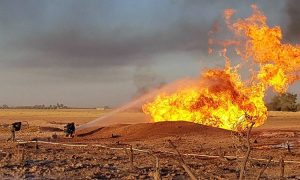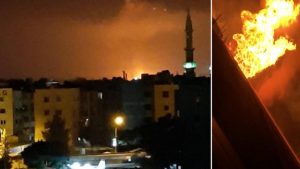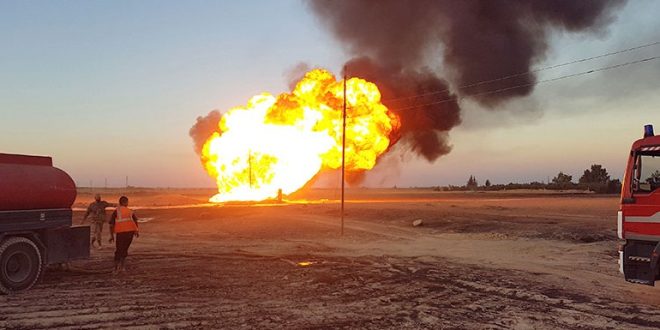24-08-2020
DAMASCUS/ TEHRAN: A suspected attack on a pipeline in Syria has caused a nationwide blackout overnight, the state news agency quoted authorities as saying on Monday.
 According to SANA, Electricity Minister Zuhair Kharbotli said a pipeline blast in the Damascus area late Sunday “led to an electricity blackout across Syria”.
According to SANA, Electricity Minister Zuhair Kharbotli said a pipeline blast in the Damascus area late Sunday “led to an electricity blackout across Syria”.
The oil minister, Ali Ghanem, said the explosion struck the line that feeds three power stations in southern Syria was a “terrorist attack”, but he did not elaborate.
Kharbotli was quoted as saying the explosion on the Arab Gas Pipeline occurred after midnight between the northeastern Damascus suburbs of Adra and al-Dhamir.
He said this was the sixth time the pipeline had been targeted and that technicians were working to fix the problem and electricity should be restored in the coming hours.
SANA published photos of a nighttime blaze it said was caused by the explosion, followed by images after dawn of a mangled pipeline missing a large chunk.
ISIL ‘upsurge’
James Jeffrey, the US pointman on Syria, told journalists in Geneva on Monday the United States was still looking into who was responsible for the pipeline attack “but it was almost certainly a strike by ISIS,” Jeffrey said, using an acronym for the armed group also known as ISIL.
 The Russia and Iran-backed Damascus government in 2018 expelled the last rebels from Dmeir, a town about 40km (25 miles) northeast of Damascus. But ISIL retains a presence in the vast Badia desert east of the town.
The Russia and Iran-backed Damascus government in 2018 expelled the last rebels from Dmeir, a town about 40km (25 miles) northeast of Damascus. But ISIL retains a presence in the vast Badia desert east of the town.
Jeffrey said, “In Syria, particularly the Badia Desert south of the Euphrates … we’re seeing an upsurge of ISIS activity.”
The Arab Gas Pipeline system extends from Egypt into Jordan and Syria.
Damascus residents say they woke up on Monday with no electricity in their homes.
The electricity minister said some power stations had been reconnected and power provided to vital infrastructure, adding that, by dawn, electricity was gradually returning to several provinces.
The incident was the latest in a string of incidents affecting the government’s energy infrastructure.
In December, near-simultaneous attacks believed to have been carried out by drones hit three government-run oil and gas installations in central Syria. One targeted the oil refinery in the central city of Homs.
In January, Syria’s government said divers had planted explosives on offshore pipelines belonging to the Banias refinery on the Mediterranean coast, but the damage had not halted operations.
 The Syrian government, opposition and civil society delegations were resuming meetings on Monday in Geneva to discuss a possible new constitution – a step seen by the UN mediator as a prospective “door-opener” to a final resolution of the country’s devastating nine-year civil war.
The Syrian government, opposition and civil society delegations were resuming meetings on Monday in Geneva to discuss a possible new constitution – a step seen by the UN mediator as a prospective “door-opener” to a final resolution of the country’s devastating nine-year civil war.
The UN’s Syria envoy, Geir Pedersen, is hosting the three, 15-member teams from Syria, while major regional and world powers – Iran, Russia, Turkey and the United States – are expected to be present on the sidelines during the week-long gathering at the UN offices in Geneva.
With a fragile ceasefire largely holding in the rebel-held region of Idlib, Pedersen said last week he is hoping to build “trust and confidence” in a UN-led process that has produced few concrete results so far.
Syria’s war has killed hundreds of thousands of people and displaced more than half the prewar population since it started in 2011 with the repression of anti-government protests.
It has also caused the Damascus government to lose control of key oil fields, causing state hydrocarbon revenues to plummet by billions of dollars. (Int’l Monitoring Desk)
 Pressmediaofindia
Pressmediaofindia




